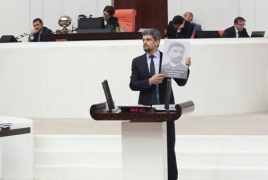Armenian MP commemorates Genocide in Turkey’s parliament April 22, 2016 - 11:23 AMT PanARMENIAN.Net - Turkish-Armenian MP Garo Paylan, who represents the People’s Democratic Party (HDP), resurrected the memories of the 13 Armenian members of the Ottoman General Assembly who were massacred on April 24, 1915 as he commemorated the 101st anniversary of the Armenian Genocide Thursday, April 21 at the Turkish Parliament, Asbarez reports. In his address to Parliament, Paylan read the names and displayed the photographs of several Armenian politicians killed, arrested, or exiled in the Armenian Genocide, including Krikor Zohrab (Istanbul), Bedros Haladjian (Istanbul), Nazaret Daghavarian (Sivas), Garabed Pashaian (Sivas), Ohannes Seringiulian (Erzurum), Onnik Tersekian (Van), Hampartsum Boyadjian (Kozan), Vahan Papazian (Van), Hagop Babikian (Tekirdağ), Karekin Pastermadjian (Erzurum), Kegham Der Garabedian (Mush), Hagop Boyadjian (Tekirdağ), and Artin Boshgezenian (Aleppo). Paylan also detailed the fate of each Armenian politician during the Armenian Genocide. During his address, which he began with the Armenian greeting “Parev tsez,” Paylan condemned the murder of the politicians and said that the Turkish state should come to terms with its history. Paylan also condemned the fact that several places in Turkey are named after the organizers and perpetrators of the Armenian Genocide. “Can you imagine going to Germany and walking on avenues named after Hitler?” Paylan asked. Paylan held up the photographs of each massacred Ottoman lawmaker of Armenian descent and read aloud their names and places of birth, and in Armenian proclaimed Աստուած հոգին լուսաւորէ—May God Bless Their Souls. He later tweeted a similar message with photographs of the martyred Ottoman Armenian Deputies.  The Armenian Genocide The Armenian Genocide (1915-23) was the deliberate and systematic destruction of the Armenian population of the Ottoman Empire during and just after World War I. It was characterized by massacres and deportations, involving forced marches under conditions designed to lead to the death of the deportees, with the total number of deaths reaching 1.5 million. Six total incidents have burned 19 old-growth trees. Friday night 8 trees were torched along the beautiful main entrance. The EU does not intend to conduct military exercises with Armenia, Lead Spokesperson for EU Foreign Affairs and Security Policy Peter Stano says. Hikmet Hajiyev has said that there is no place for USAID operation in Azerbaijan any longer. A telephone conversation between Putin and Pashinyan before the CSTO summit is not planned, Peskov says. Partner news |